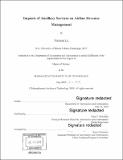Impacts of ancillary services on airline revenue management
Author(s)
Lu, Yuxuan(Aeronautics scientist)Massachusetts Institute of Technology.
Download1119730824-MIT.pdf (30.68Mb)
Other Contributors
Massachusetts Institute of Technology. Department of Aeronautics and Astronautics.
Advisor
Peter P. Belobaba.
Terms of use
Metadata
Show full item recordAbstract
Ancillary services have been contributing increasing amounts to airlines' total revenue. Over the past decade, the number of ancillary services offered by airlines has proliferated, the quality has improved, and they have provided benefits for both carriers and passengers. Nevertheless, the pricing of the services, and particularly the interactions between the pricing of ancillary services and the airline ticket, has not been examined in competitive networks with varying passenger behavior assumptions. This thesis presents simulation tests quantifying the effects of ancillary revenues on airlines' total revenue and other performance metrics. We first introduce the history of airline ancillary services, explain the current airline revenue management process and fare structure upon which ancillary purchases are based, and summarize past literature on airline revenue management systems and airline ancillary services. We then qualitatively explain current passenger ancillary purchase behavior models, including sequential and simultaneous choice behaviors, and the impacts of the assumed behaviors on airline ticket selections and ancillary purchases. We then test the impacts of ancillary service pricing under the assumptions of our simulation environment, the Passenger Origin-Destination Simulator. We test ancillary services under different scenarios, including charging passengers differently (ancillary price segmentation) and providing services differently to passengers (ancillary disutility differentiation) for different trip purposes. The results show that the pricing of ancillary services can be leveraged by an airline as a pricing tool; when an airline discounts an ancillary service, it can gain revenue at the expense of other airlines. In our tests, when an airline discounts ancillary services for leisure passengers but charges a premium to business passengers, it observes a 3.45% total revenue gain mostly from increased leisure passengers' ticket revenues. The benefits of this asymmetric pricing could be lost when other airlines match this discounted price. Furthermore, the results also indicate that symmetric optimization of ancillary service pricing by all airlines in the market can lead to industry gains as high as 1.47% in terms of total revenue. With some ancillary pricing structures, the introduction of ancillary services encourages passengers to pay more for the ticket. The opposite scenarios are also observed in some cases when the introduction of a service leads to a reduction in ticket revenue.
Description
Thesis: S.M., Massachusetts Institute of Technology, Department of Aeronautics and Astronautics, 2019 Cataloged from PDF version of thesis. Includes bibliographical references (pages 153-156).
Date issued
2019Department
Massachusetts Institute of Technology. Department of Aeronautics and AstronauticsPublisher
Massachusetts Institute of Technology
Keywords
Aeronautics and Astronautics.